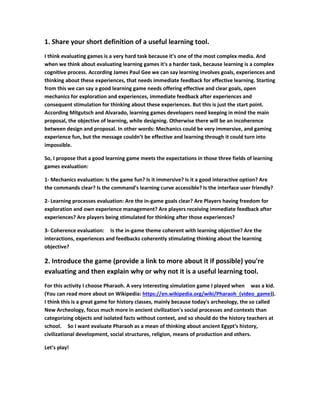
Learning Games
- 1. 1. Share your short definition of a useful learning tool. I think evaluating games is a very hard task because it's one of the most complex media. And when we think about evaluating learning games it's a harder task, because learning is a complex cognitive process. According James Paul Gee we can say learning involves goals, experiences and thinking about these experiences, that needs immediate feedback for effective learning. Starting from this we can say a good learning game needs offering effective and clear goals, open mechanics for exploration and experiences, immediate feedback after experiences and consequent stimulation for thinking about these experiences. But this is just the start point. According Mitgutsch and Alvarado, learning games developers need keeping in mind the main proposal, the objective of learning, while designing. Otherwise there will be an incoherence between design and proposal. In other words: Mechanics could be very immersive, and gaming experience fun, but the message couldn’t be effective and learning through it could turn into impossible. So, I propose that a good learning game meets the expectations in those three fields of learning games evaluation: 1- Mechanics evaluation: Is the game fun? Is it immersive? Is it a good interactive option? Are the commands clear? Is the command's learning curve accessible? Is the interface user friendly? 2- Learning processes evaluation: Are the in-game goals clear? Are Players having freedom for exploration and own experience management? Are players receiving immediate feedback after experiences? Are players being stimulated for thinking after those experiences? 3- Coherence evaluation: Is the in-game theme coherent with learning objective? Are the interactions, experiences and feedbacks coherently stimulating thinking about the learning objective? 2. Introduce the game (provide a link to more about it if possible) you're evaluating and then explain why or why not it is a useful learning tool. For this activity I choose Pharaoh. A very interesting simulation game I played when was a kid. (You can read more about on Wikipedia: https://en.wikipedia.org/wiki/Pharaoh_(video_game)). I think this is a great game for history classes, mainly because today's archeology, the so called New Archeology, focus much more in ancient civilization's social processes and contexts than categorizing objects and isolated facts without context, and so should do the history teachers at school. So I want evaluate Pharaoh as a mean of thinking about ancient Egypt's history, civilizational development, social structures, religion, means of production and others. Let’s play!
- 2. Here I start my family which will rule Egypt. I choose Kytzia as my name, it's an Egyptian name which means "morning light", but other players can choose the name they want to. Well, here we can analyze that gameplay is subdivided by five different periods, these are historical periods that subdivides ancient Egypt's history in time. It’s very good for thinking about civilizational development; so here we have the first coherence between design and learning objective. Other important thing to notice is the small feedback about the era you are about to play.
- 3. Now I've joined Pre-dynastic period, where we have another screen with more historical feedback. Think it’s awesome for contextualizing what we're going to do. This level’s objectives are set at the top of screen, and we can conclude the great learning objective here is understand how the first settlements in ancient Egypt's area begins.
- 5. Here we see more tutorials, those make interfaces and commands very friendly. Let's take a look at gameplay... Stared at this blank map that can be explored and houses built anywhere. Commands are clear and menus are simple. Game gives you feedback all time. Goals are clear and explicitly given. (First goal is on screen's top)
- 6. So...Build some houses and people settled in them. But nothing happens, houses doesn't developed beyond crude huts. So... Right clicking at one of those houses and there’s some feedback about what was going on... This is saying the house cannot involve as it does not have access to even the most primitive water source.
- 7. It's a very important thing. Wells and oases were crucial in lives of those nomadic people who settled on the first cities. So... Now I know the need of building houses near green lands, where some wells can be placed.
- 9. After that a new intervention appears saying I need some food for my people. Here are placed new information about civilizational development. At this point we need hunting ostriches instead of sowing Nile's fertile lands, because hunting comes before farming in human development history. Giving my people food and water, houses grow, I reach the goals and win first stage.
- 10. This is the next stage’s goals. Many years has passed and we need to evolve our city including building god's temples and mining some gold.
- 11. Here we have some instructions about gold mining and crime preventing. I think those are good next steps in civilizational development.
- 12. This is an overview of my city.
- 13. And now we have some instructions about gods. Well… it's a good way for learning about all this civilization's gods and its religious structures. I'll not extend this anymore (It is a very long game with many stages). Anyway this game has a couple of good resources for teaching history for kids. I think it meets expectations on the three proposed fields for learning games evaluation: mechanics, learning processes and coherence. Hope I made this explicit for you on my comments about Pharaoh's gameplay.
